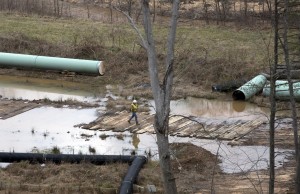From an Article by Laurence Hammack, Roanoke Times, March 10, 2020
At a time when building the Mountain Valley Pipeline was focused almost entirely on controlling erosion, muddy runoff continued to flow from dormant construction sites.
In a letter last month to a conservation group that first raised the issue, Virginia Department of Environmental Quality Director David Paylor said the infractions would be forwarded to the state attorney general’s office, which has the authority to seek tough financial penalties.
VA-DEQ is “committed to aggressively and effectively enforcing and maintaining compliance of the Mountain Valley Pipeline construction,” Paylor wrote in a Feb. 13 letter to David Sligh, conservation director of Wild Virginia. Sligh made the letters public this week.
Sligh had asked the week before about DEQ inspections that showed violations of erosion and sediment control regulations from Sept. 19 through Dec. 20, 2019 — when construction of the controversial natural gas pipeline was stalled by legal action, leaving workers to concentrate largely on efforts to curb erosion.
The violations were especially troubling, Sligh wrote, because they began so shortly after Sept. 18 — the last day covered by a consent decree in which Mountain Valley agreed to pay Virginia $2.15 million to settle a lawsuit that alleged similar problems in the past. Approved in December, the consent decree carried a provision for enhanced fines should the same issues recur.
Paylor wrote a month ago in his letter to Sligh that “DEQ acknowledges noncompliance noted in inspection reports during the last quarter of 2019. These will be communicated to the Office of the Attorney General for inclusion in a future demand for penalties.”
But no demand had apparently been made by Tuesday. DEQ spokeswoman Ann Regn said the agency is “compiling noncompliance information monthly” and will notify Mountain Valley, in conjunction with the attorney general, of any violations or penalties.
A spokeswoman for Mountain Valley said the company had not been told of any recent violations. “MVP continues to work cooperatively with the DEQ,” Natalie Cox wrote in an email.
In a follow-up letter to Paylor on Monday, Sligh urged the state to act promptly. — “Violations by MVP, which have been frequent and damaging to waterbodies and landowners, must not be handled as routine occurrences,” he wrote. “If construction resumes, the history of this project tells us that the frequency and magnitude of violations is likely to increase, unless DEQ shows that it will act quickly and decisively.”
An attorney for Mountain Valley accused Sligh of making “inaccurate and misleading statements” about the company’s compliance with erosion and sediment control regulations.
It’s not unusual for silt fences, sediment traps and other erosion control devices to be breached by heavy rains, but those “deficiencies” can be quickly repaired and do not amount to formal violations, Todd Normane, deputy general counsel for Equitrans Midstream Corp., wrote in a Feb. 25 letter to Sligh that was posted to the Federal Energy Regulatory Commission’s online docket.
“There is a persistent misconception that Virginia law prohibits the discharge of sediment-laden storm water from a construction site,” Normane wrote. “That is legally incorrect and factually impossible.
“The inspection reports cited in your letter do not represent violations and the ‘aggressive enforcement action’ requested by Wild Virginia is not warranted,” the letter stated. Sligh, however, said it appears that his reading of the reports was borne out by Paylor’s letter.
Normane also accused Wild Virginia and other environmental groups of making matters worse by filing multiple legal challenges, which have delayed pipeline construction and forced the use of temporary erosion control measures that are more vulnerable to storms.
“If Wild Virginia’s concern is truly erosion and sedimentation, then the best environmental outcome is to support the completion of construction as soon as possible so that the ROW [right of way] can be fully restored and revegetated,” he wrote.
Wild Virginia reviewed 67 inspection reports from between Sept. 19 and Dec. 20, covering work sites in the six Virginia counties — Giles, Craig, Montgomery, Roanoke, Franklin and Pittsylvania — though which the pipeline will pass on its route from northern West Virginia to Chatham.
Three of the inspections found that Mountain Valley had not installed erosion control devices as required by the state, Sligh wrote in his letter. In another 19, DEQ officials determined that the devices were not properly maintained. And in at least eight cases, sediment was washed away from the 125-foot -wide construction right of way.
The problems came after Mountain Valley suspended work on parts of the pipeline after Wild Virginia and other groups raised questions in a lawsuit about the project’s impact on endangered or threatened species of fish and bats in its path.
The 4th U.S. Circuit Court of Appeals issued a stay of the U.S. Fish and Wildlife Service’s approval for the pipeline, which was followed Oct. 15 by an order from FERC that all pipeline work cease, except for stabilization and erosion control efforts.
Although other legal challenges have led to the suspension of two other sets of federal permits, Mountain Valley says it expects to obtain new approvals in time to complete the 303-mile pipeline by the end of the year.
##############################
See also: Updated Status of Principal Legal Challenges to the ACP Now Available, Allegheny Blue Ridge Alliance, Update #267, March 12, 2020 — The new update on the status of the principal legal challenges to the Atlantic Coast Pipeline (ACP) is now available on the ABRA website.

